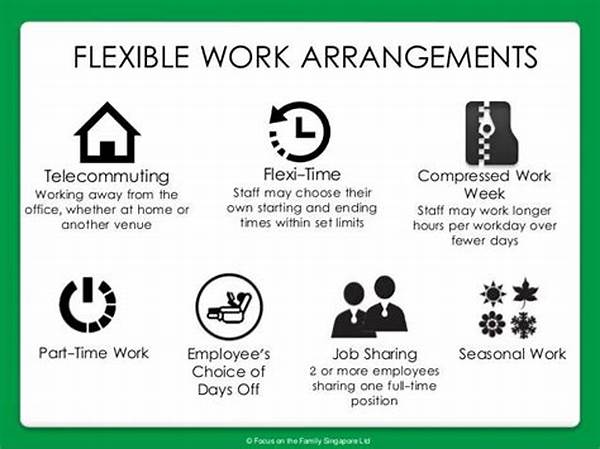Hey there, fellow work enthusiasts! Let’s chat about something that’s been on everyone’s mind lately: flexible work arrangements and how crucial they’ve become in our lives. Whether you’ve been working from your comfy couch or logging in from a cool café, the ability to shape your work environment around your life is a game-changer. Ready to dive in? Grab your favorite drink, and let’s explore why this trend is more important than ever.
Read Now : “standout Final Performance Moments”
Why Flexible Work Arrangements Matter
Let’s kick things off by looking at why flexible work arrangements are more than just a passing trend. Imagine a world where your work schedule fits around your lifestyle, not the other way around. It sounds dreamy, right? Well, that’s the magic of flexible work arrangements!
In today’s fast-paced world, the flexible work arrangements importance can’t be overstated. They empower employees to be more productive and happy by allowing them to choose when and where they work. It’s all about creating a balance that suits each individual’s needs. Plus, happy employees mean happy customers, so it’s a win-win for businesses too!
Companies embracing flexible work arrangements are seeing the benefits firsthand. These policies can reduce turnover, increase job satisfaction, and attract top talent. In a competitive job market, offering flexibility isn’t just a nice-to-have; it’s a must-have. So, if your company isn’t on board yet, it might be time to start a conversation.
Benefits of Embracing Flexibility at Work
1. Increased Productivity: When employees have control over their schedules, they tend to be more productive. The flexible work arrangements importance is clear as it helps in tapping into peak productivity times.
2. Better Work-Life Balance: Flexibility allows people to juggle work and personal life more efficiently, reducing stress – a solid reason why flexible work arrangements importance is often highlighted.
3. Reduced Commute Stress: Skipping the daily commute saves time and lowers stress, making it one of the major points in the flexible work arrangements importance list.
4. Attracting Talent: Companies offering flexible options stand out, making them more attractive to top talent. It’s a recruitment strategy showing the flexible work arrangements importance.
5. Cost Savings: Employees save on travel costs and businesses save on office space, proving the flexible work arrangements importance in financial terms too.
Challenges and Solutions
So, let’s get real for a moment. While the flexible work arrangements importance is undeniable, it’s not sunshine and rainbows all the time. Challenges can crop up when implementing these changes, and it’s totally okay! The trick is knowing how to tackle them head-on.
One major hiccup is communication. With everyone working at different times and places, staying connected can be tough. The workaround? Implementing the right tools—think Slack, Zoom, or Teams. These platforms ensure everyone stays in the loop, no matter where they are. Another common challenge is maintaining a company culture. Regular virtual hangouts or check-ins can keep the team spirit alive. So, while flexible work comes with its challenges, there’s always a solution around the corner.
Practical Tips for Implementing Flexibility
1. Set Clear Expectations: Establishing clear goals and guidelines helps manage expectations, highlighting the flexible work arrangements importance for team success.
2. Leverage Technology: Use tools to collaborate effectively, ensuring communication remains seamless despite different work settings—a crucial aspect of flexible work arrangements importance.
3. Promote Transparency: Regular check-ins promote transparency and trust within teams, a core part of understanding the flexible work arrangements importance.
Read Now : Online Team Communication Tools
4. Offer Resources: Providing resources for home offices helps employees transition smoothly, emphasizing the flexible work arrangements importance for a conducive work environment.
5. Feedback Channels: Encourage feedback to continuously improve the system, underscoring the flexible work arrangements importance by adapting to employee needs.
6. Engage in Team Activities: Keep the team spirit alive with occasional virtual meet-ups, signaling the flexible work arrangements importance in maintaining a connected team.
7. Guide Time Management: Provide training on time management to help employees adjust, reinforcing the flexible work arrangements importance in leveraging flexibility effectively.
8. Recognize and Reward: Acknowledge hard work and flexibility, enhancing morale and emphasizing flexible work arrangements importance in fostering motivation.
9. Adapt and Evolve: Be adaptable to changes and new challenges, showcasing your understanding of the flexible work arrangements importance as new demands arise.
10. Celebrate Achievements: Celebrate milestones and successes, which enhances a sense of unity and highlights the flexible work arrangements importance in achieving goals.
Embracing Change: The Road Ahead
As we look ahead, the flexible work arrangements importance is only going to grow. With technology advancing at lightning speed, working from anywhere is becoming the new norm. Hybrid models are emerging as a popular choice, blending the benefits of remote work with face-to-face interactions. Companies that adapt to these changes are likely to thrive in the future landscape.
The essence of flexible work arrangements lies in trust. Trusting employees to deliver results while managing their own time. It’s about empowering people to do their best work, no matter where they are. This mindset shift is driving companies to rethink traditional office setups, paving the way for a more innovative and dynamic work culture.
Concluding Thoughts
Reflecting on our chat today, it’s crystal clear that flexible work arrangements importance can’t be overlooked. They’ve reshaped our understanding of productivity, happiness, and success in the professional world. For employees, flexibility means more control and less stress, leading to happier, healthier lives.
For companies, embracing flexibility can mean the difference between stagnation and innovation. As businesses strive to remain competitive, those that acknowledge the flexible work arrangements importance are poised to attract and retain the best talent. So, whether you’re an employee or an employer, it’s time to embrace this flexible future with open arms. Here’s to creating a working world that works for everyone!
